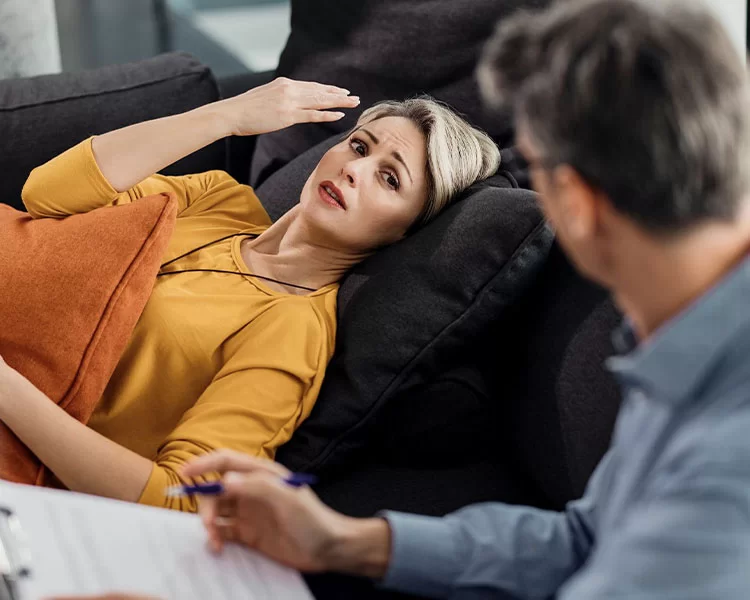- Mumbai, New Delhi, Bangalore
- (+91) 81518 30000
- WhatsApp Now
- contact@vedawellnessworld.com
Depression is a mood disorder characterized by feelings of sadness and loss of interest. It impacts one’s day to day life, affects how you feel, think and behave and can lead to a variety of emotional and physical problems. Causes can range from biological differences, to brain chemistry and hormonal concerns, to inherited traits and social factors like stress and trauma.
The treatments vary depending on the severity of the symptoms, as well as may vary from person to person.


The best way to find the most effective treatment is to work with a mental health professional. They can help you to get an accurate diagnosis and create a comprehensive treatment plan.
Embark on a transformative journey towards healing at Veda, where we offer unparalleled treatment for depression. Our luxury rehab centers provide personalized care and innovative therapies tailored to your unique needs. Trust in our expertise for the best treatment for depression, and let us guide you towards a brighter tomorrow through compassionate rehabilitation for depression.
Phase 1: Comprehensive Mental and Medical Assessments
Clients undergo a thorough orientation followed by comprehensive medical, psychiatric, and nutritional evaluations conducted by expert consultants. These evaluations help establish a clear understanding of each client’s physical and psychological state, facilitating the development of tailored treatment plans. Psychological assessments are conducted to understand the specific needs of each client, leading to psychoeducation sessions that enhance clients’ understanding of their depression and initiate various therapeutic techniques.
Phase 2: Psychoeducation and Initial Adjustment
During this phase, clients receive personalized sleep schedules, daily routines, and dietary plans based on their initial assessments. These plans are developed collaboratively to support clients’ physical and mental adjustment. Psychoeducation continues, helping clients understand their depression and the steps necessary for recovery.
Phase 3: Psychotherapy
Individual Therapy:
Tailoring treatment to address specific issues the client is facing, applying evidence-based therapeutic techniques to real-life situations, and working on individual goals like reducing depressive symptoms, improving mood, and enhancing coping strategies.
Group Skills Training:
Helps learn practical skills in a group setting to manage emotions, relationships, and stress. Typically involves weekly sessions, each lasting about 1.5 hours, with a group of individuals.
Stages of Psychotherapy:
Stage 1: Stabilizing Mood and Behavior
In the first phase of therapy, the focus is on stabilizing the client by addressing and reducing symptoms of depression, such as persistent sadness, loss of interest, and suicidal thoughts. Behavioral activation and immediate coping strategies are introduced to establish safety and achieve basic stability.
Stage 2: Emotional Processing and Regulation
Once the client has stabilized, the next phase involves addressing underlying emotional issues and helping them experience and process emotions in a healthier way. Cognitive Behavioural Therapy (CBT) techniques are also employed to identify and challenge negative thoughts.
Stage 3: Developing Healthy Lifestyle and Coping Skills
In this phase, the focus shifts to enhancing the client’s ability to cope with daily life by developing a healthy lifestyle. This includes improving day-to-day functioning, creating healthy habits, and developing practical coping skills.
Stage 4: Sustaining Recovery, Reintegration and Personal Development
The final stage involves maintaining the progress achieved and reintegrate into daily life by rebuilding self-esteem and rediscovering their interests. Therapeutic support focuses on encouraging activities that bring self-fulfillment, setting meaningful goals and strengthening connections.
Phase 4: Preparing for Discharge
Therapists work with clients to develop a comprehensive relapse prevention plan and address reality adjustment issues. This ensures that clients are prepared for the outside world and can effectively apply the techniques learned during therapy.
Phase 5: Post-Discharge
Follow-up sessions are scheduled to monitor clients’ progress and provide ongoing support. These sessions are crucial for ensuring long-term recovery and well-being, helping clients maintain the gains achieved during treatment.
Daily Holistic Practices
To support your recovery, we offer daily sessions in:
Additionally, we provide holistic and alternative therapies (available at an additional cost) such as:
Sound Healing: Utilizes therapeutic sound waves to reduce stress, promote relaxation, and improve mental clarity by balancing the body’s energy fields.
Art Therapy: Encourages creative expression to help clients process emotions, reduce anxiety, and improve mental health through guided artistic activities.
Additional Support
We provide various alternatives to support recovery and have a 24/7 center administration team that monitors and manages any additional addictions, helping clients gradually reduce their consumption.
Family and Couple Interventions
Understanding the importance of social support, we offer family and couple interventions during weekends or based on availability to foster understanding and support outside the center.